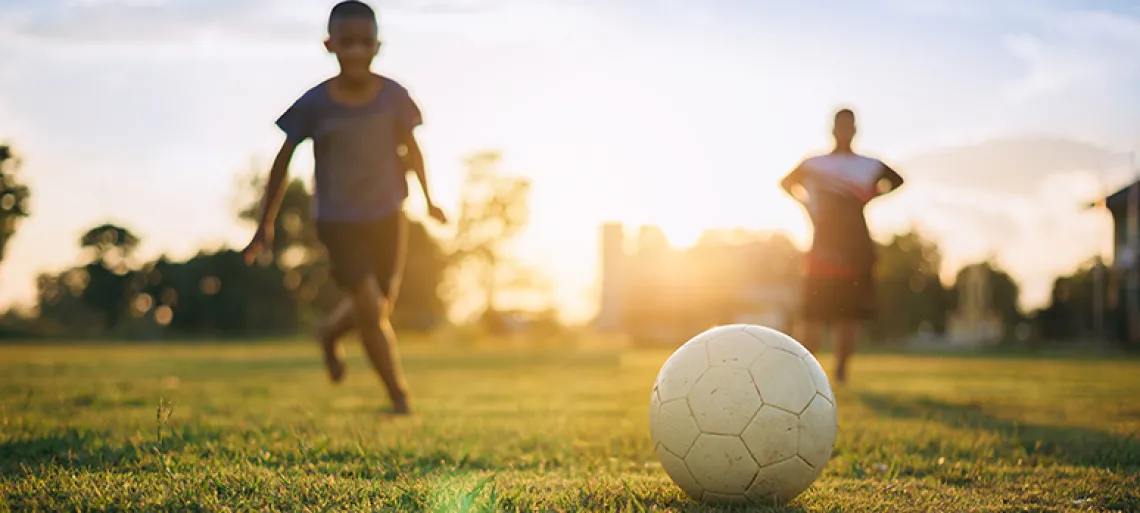Enjoying Sports Safely

Sports, games and fun recreational pursuits can be great ways to stay active and to meet new people. But some of these activities can easily lead to injuries and accidents if you do not take the proper precautions. To reduce your chances of getting hurt, it is important to learn the safety rules of the sport, take some common-sense precautions, wear the appropriate gear and use the necessary equipment properly.
Read more to learn how to protect yourself on the field or court, in the gym, on the bike path, or anywhere you are physically active.
General Safety Tips
- Always learn and abide by the rules of the sport you are participating in. The rules are there for your own safety as well as the safety of your teammates and opponents.
- Wear the proper apparel and protective gear appropriate for the sport, both during practices and games. Wearing equipment can help prevent facial damage, concussions, and eye and brain injuries.
- Helmets should always be worn when playing football, baseball, softball and hockey, and when engaging in wheel or blade activities (bicycling, rollerblading, skating and skateboarding).
- Make sure to drink enough liquids before, during and after an activity. Water and special sports drinks help replenish the body's vital fluids, especially while indoors and outside in hot temperatures. Athletes can quickly become dehydrated if they do not maintain their water intake.
- Check your equipment regularly. In-line skates, skateboards, bikes and roller skates should be inspected thoroughly for loose or faulty parts on a regular basis. Bring your bicycle into a certified bike store at least once a year for a tune-up, especially to check the brakes.
- Learn how to properly warm-up before games and activities. Take a few minutes to stretch out major muscles, engage in a few light calisthenics and do some light jogging before beginning the game or activity.
- Never push yourself to win a game or excel at an activity at all costs. Remind yourself that sports and recreational activities are about having fun.
- Be sure you get enough rest. A good night's sleep, as well as proper rest and relaxation after engaging in athletic activity, is essential for physical health.
Sports Injuries and Pain
- Never play through pain. Nagging pain or slight injury can turn into a serious medical problem if it is not addressed immediately. Swelling with pain and limitation of motion are two red flags that the injury may be more serious than expected.
- Always apply ice, not heat, as a first-aid treatment immediately after sustaining a minor sports injury. Use a water-based (not chemical) ice pack.
- Always seek prompt medical attention if you are hurt or have sustained more than a minor injury; do not wait. What looks like a simple sprain can often be a fracture.
- Do not move if you feel that you have sustained a serious injury. Lie still on the field, court or wherever you have fallen (provided you are out of harm's way) and wait for help to arrive.
Recommended Safety Gear
Mouthguards: These can and should be worn for just about any imaginable contact sport. Your dentist can help you find a mouthguard that is appropriate for you and your sport.
Faceshields: These are musts for certain sports such as hockey (goalies) and fencing, and optional for other sports (e.g., wearing goggles while swimming or playing basketball, or wearing a helmet visor while playing football).
Pads: You should wear elbow and ankle pads and wrist guards while rollerblading, skating, skateboarding and bicycling.
Footwear: Wear shoes that are in good condition and that are appropriate for the sport you are playing. Shoes should be able to absorb shock, support the foot and leg, fit comfortably and resist water. Make sure to wear a thick, sweat-absorbent pair of socks.
Resources
©2024 ComPsych ® Corporation. All rights reserved. This information is for educational purposes only. It is always important to consult with the appropriate professional on financial, medical, legal, behavioral or other issues. As you read this information, it is your responsibility to make sure that the facts and ideas apply to your situation.

